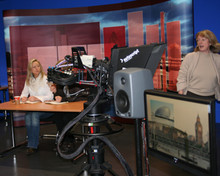
Broadcast students often had to record interviews in little more than a cupboard, admits the head of the school, Professor Adrian Monck. Online wasn't always the main priority, even until fairly recently.
But now a £12 million cash injection has transformed stifled, small computer rooms to state-of-the-art, sprawling computer suites and newsrooms, including two sound-proof audio rooms for radio and podcast recording, a digital editing suite and a broadcast studio, with a removable seating gallery for extra space.
'Probably the world's largest graduate school', is how Monck bills it. It's certainly the UK's largest with 4,000 alumni and 272 current postgraduate journalism students - more if the publishing and creative writing courses are included.
In the last couple of years, online journalism has become an obligatory part of all its postgraduate courses. While students still pick the newspaper, broadcast, magazine or international option for their nine-month postgraduate diploma (or 12-month MA), boundaries increasingly overlap, with all students being introduced to podcast, video and social media skills. Courses now also include specialised MAs in investigative journalism and political reporting&campaigning.
Jonathan Hewett, director of the newspaper course, says that while some students are 'a little slower' to pick up online skills, the current intake have seized online opportunities, with many using Twitter and the majority starting blogs.
Practically speaking, there are new teaching screens in the computer rooms and shared server space rivalling that of its commercial counterparts, but the new centre also marks a gradual change in philosophical approach. The transparent computer rooms are not just about making the rooms lighter; they're also about encouraging interaction and community, Monck explains.
"There's a real buzz about the place now," he says. While Monck 'hasn't made a big song and dance' about curriculum changes and the launch of the new facility, he confirms that it marks a new focus on international journalism for the university.
Graduates will enter 'the global English language market', Monck says. They can expect to go to Abu Dhabi and work for Martin Newland's new paper, The National, or head off to China; a first job reporting for the Dow Jones international newswire, could be as likely as a UK-based one, he predicts. No longer will they be expected to put in their time at a regional paper, like Monck's own peers, he says.
He maintains that postgraduate applications have not fallen and courses are still oversubscribed, despite the undeniable drop in job market: the best will still 'rise to the top,' he says.
Monck himself is cultivating international links - in the US with universities like Berkeley and New York University - and in Hong Kong, where he is the external assessor for the University's journalism and media studies centre. "Journalism is a large part of what City is known for, internationally," says Monck, and it's a reputation the institution is keen to preserve, having self-funded the £12 million project.
The department drew on the expertise of several companies: the firm behind the Mac computer suite, Video Rescue, did Trinity Mirror's; and the digital editing suite was built by Dega, who worked at BBC's Broadcasting House.
There's still some work being done now and the postgraduate research centre isn't yet finished, but to all intents and purposes the department is all moved in.
Monck still has his own office tucked away at the rear of the department, but most of the staff have now moved to a large open-plan office.
An official launch is expected in May, but, as Monck keeps saying, the changes don't stop here.
Free daily newsletter
If you like our news and feature articles, you can sign up to receive our free daily (Mon-Fri) email newsletter (mobile friendly).
Related articles
- Meet the inspiring, disabled journalists working their dream jobs
- Shaping the future of journalism: insights for the next generation
- New free course on war reporting launched
- News subscriptions hit a snag amid cost-of-living crisis, RISJ report finds
- Solutions journalism superstars: media mentor and trainer, Swati Sanyal Tarafdar









